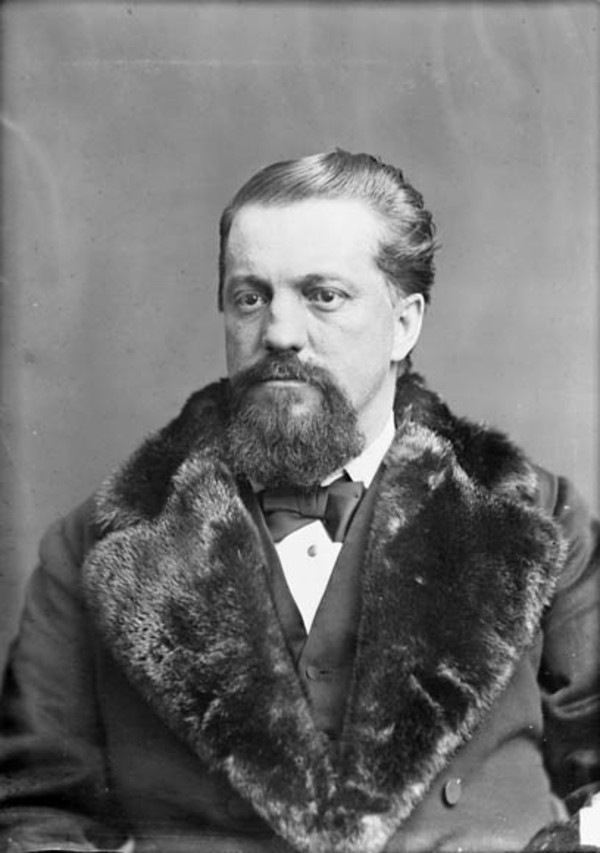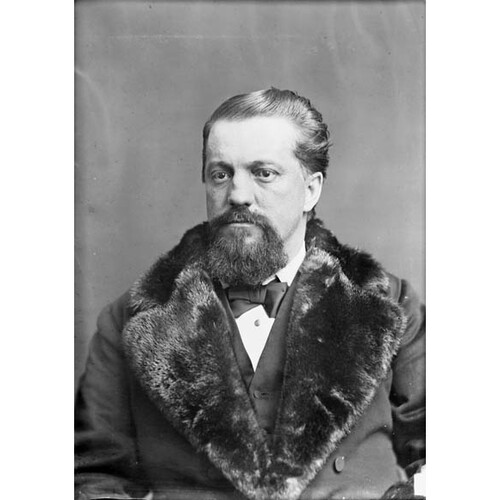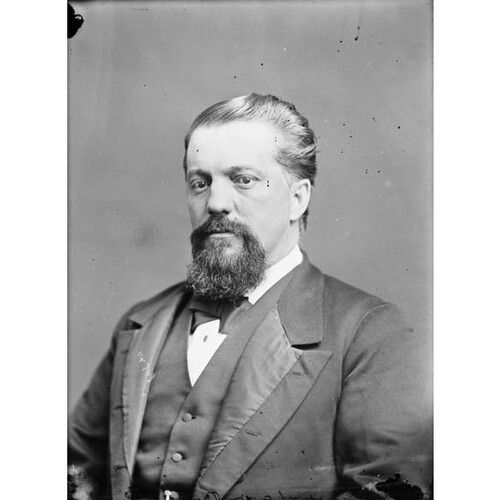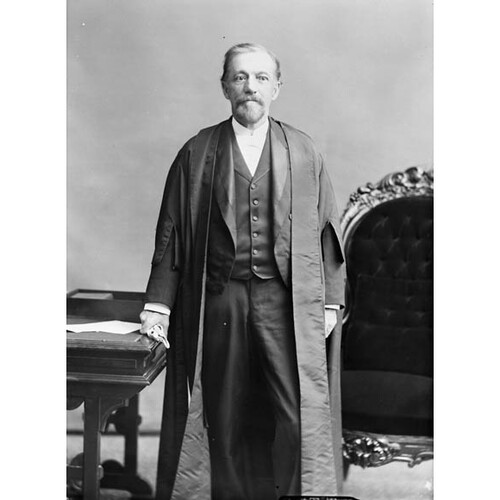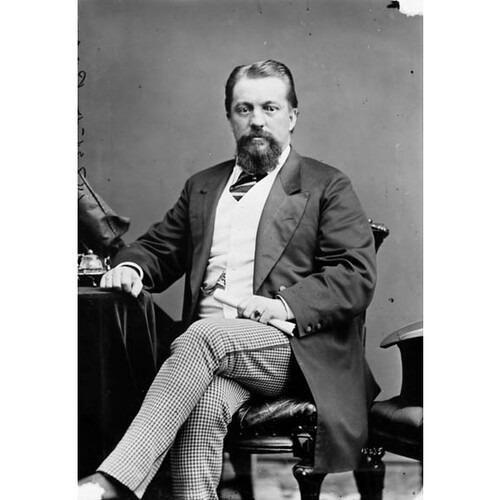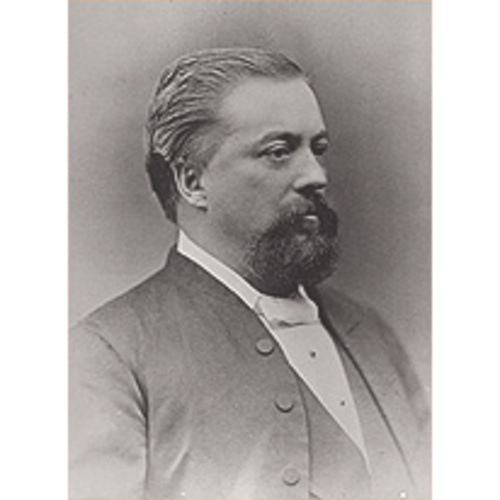ROSS, JOHN JONES, physician, militia officer, and politician; b. 16 Aug. 1831 in Quebec City, only son of George McIntosh Ross, a merchant trading to the West Indies, and Sophie-Éloïse Gouin; m. 8 Aug. 1854 Arline Lanouette, daughter of Joseph-Édouard Lanouette, in Champlain, Que.; they had no children; d. 4 May 1901 in Sainte-Anne-de-la-Pérade (La Pérade), Que.
John Jones Ross attended the Petit Séminaire de Québec from 1844 to 1847. He left after his third year in the classical program (Method) to study medicine through apprenticeship to a physician in the Trois-Rivières area. On 12 May 1853 he was licensed to practise, having successfully completed the examination set by the College of Physicians and Surgeons of Lower Canada. Returning to Sainte-Anne-de-la-Pérade, the parish in which he had grown up and one without a resident physician, Ross became a typical country doctor, involved in all spheres of communal activity – medical, military, social, agricultural, and later political. Besides his practice, he served as surgeon to the 1st Battalion of Champlain Militia. In 1865 he was elected a member of the board of the College of Physicians and Surgeons of Lower Canada as representative for the district of Trois-Rivières; from 1883 to 1889 he was vice-president of the college and from 1889 to 1895, president. Ross also became honorary president of the Agricultural Society of Champlain County and was a member of the Quebec Council of Agriculture from 1862 to 1890. Above all else, however, he was drawn into politics, which came to dominate his life.
Ross was first elected to the Legislative Assembly for the Province of Canada in 1861 to represent Champlain, and he was re-elected in 1863. Although a supporter of George-Étienne Cartier*, the French Canadian Conservative leader, Ross broke with the government of Cartier and John A. Macdonald* over the Militia Bill of 1862, which provided for increased spending on defence against the United States. After the government’s defeat on the issue, he once again supported Cartier, and later confederation.
In 1867 Ross ran successfully in Champlain for both the House of Commons and the Legislative Assembly of Quebec. Shortly thereafter, on 2 November of the same year, he resigned from the assembly to accept an appointment to the Legislative Council for Shawinigan. He would remain a member of the upper house until his death.
In both the Legislative Council and the House of Commons, Ross focused on the economic development of his region. Besides promoting the establishment of banks in rural areas to encourage trade and industry, he advocated railway construction. Like many politicians of the era, he was imbued with railway mania. Railways were seen as the panacea for economic underdevelopment in Quebec and thus as a way of providing employment for French Canadians, who were leaving the province in what Ross considered to be alarming numbers. Not surprisingly, in the summer of 1870, Ross, the leader of the provincial Conservatives in the Trois-Rivières region, was elected a director of the North Shore Railway, which traversed the district linking Quebec City to Montreal. A vice-president by 1875, he worked hard for the company, securing subsidies from towns in his region and supporting government land grants to the railway.
While Ross embraced current ideas and innovation in the economic sphere, he clung doggedly to tradition in other areas. His conservatism sharpened in opposition to universal suffrage and the secret ballot, electoral reforms promoted by the Liberals. Ross believed that only those who had a stake in society, those with property, should vote. His preference for custom and practice and his profound Catholic beliefs led him to flirt with the Programmistes, adherents of the Programme catholique, an ultramontane political manifesto drawn up by François-Xavier-Anselme Trudel* and others and published in April 1871. The Programmistes sought to make politics both pure and Catholic, and urged voters to support only those candidates who favoured the supremacy of church over state. Although Ross had not signed the Programme, he wrote a letter of adherence to it shortly after its publication. When Cartier complained to the Catholic hierarchy about this attempt to form a Catholic party within the Conservative ranks, Archbishop Elzéar-Alexandre Taschereau* issued a circular letter condemning the document. Ross then withdrew his support, even though his own bishop, Louis-François Laflèche*, approved of the Programme. In the provincial election of June 1871, Ross promoted his own Conservative candidate in Champlain, rejecting the Programmiste Trudel, who was none the less elected.
Ross’s loyalty to Cartier was generously rewarded in 1873. Acting on advice from Ottawa, the new premier of Quebec, Gédéon Ouimet, called on him to represent the region of Trois-Rivières in his ministry. Ross accepted, and on 27 Feb. 1873 he became speaker of the Legislative Council and thus automatically a member of the provincial cabinet. The duties of this office were difficult to discharge since the two roles were not always compatible. He was required as speaker to preside over debate in a non-partisan fashion, yet as a member of cabinet he had to introduce government legislation and speak on behalf of the government. Ross, an intelligent and sensible man, carried out his sometimes conflicting responsibilities with remarkable skill.
Almost coincidently with his appointment to cabinet, Ross was forced to choose between his provincial and federal careers. In May 1873 the federal government abolished the double mandate, except for senators; Ross thus decided not to contest the federal election of 1874. Avoiding the Pacific Scandal, which caused the downfall of Macdonald’s Conservative government, he fell upon the Tanneries affair [see Louis Archambeault*], which brought down Ouimet’s government.
Ross had participated in the cabinet decision to exchange a parcel of land owned by the government in the village of Les Tanneries for one on Coteau Saint-Pierre of considerably less value. Scrupulously honest himself, he saw no corruption in the actions of his two colleagues directly implicated in the scandal, Ouimet and Solicitor General Joseph-Adolphe Chapleau*, but he came to believe that “imprudence” and “a lack of foresight” had prevented the cabinet from making a better decision. Because of the intensity of the controversy and the resignation of Attorney General George Irvine*, Ross believed that the government’s credibility was irreparably damaged and he handed in his resignation on 5 Aug. 1874.
When the legislature reconvened in December, the new government of Charles-Eugène Boucher* de Boucherville immediately established a committee to probe into the Tanneries affair. Its report having cleared the members of Ouimet’s cabinet, Ross and his colleagues were restored to grace and again able to accept political office. The opportunity came when the government decided to take over two bankrupt railways – the North Shore and the Montreal Northern Colonization – to create the Quebec, Montreal, Ottawa and Occidental Railway, a line running from Quebec City through Montreal to Ottawa with the prospect of joining the projected railway to the Pacific and thereby ensuring Quebec as the eastern terminus of the transcontinental line. The provincial treasurer, Joseph Gibb Robertson*, who represented Sherbrooke on the south shore, resigned in protest. In reorganizing his cabinet on 25 Jan. 1876, Boucher de Boucherville turned to Ross and made him again speaker of the Legislative Council.
Once more, Ross’s term of office was relatively short-lived. On 2 March 1878 the lieutenant governor, Luc Letellier* de Saint-Just, dismissed Boucher de Boucherville’s government from office despite its healthy majority. Ross lost his cabinet post through this so-called coup d’état.
Although Boucher de Boucherville was also a member of the Legislative Council, it was Ross who led the attack in the upper house against the new Liberal government of Henri-Gustave Joly, coordinating efforts with Chapleau, who led the Conservatives in the assembly following the elections of May 1878. Ross, an uncompromising politician, proposed on 27 Aug. 1879 that the Legislative Council postpone the vote on supply, which had narrowly passed the assembly, specifying that his motion was a reprisal against members of Joly’s government for having acquiesced in the lieutenant governor’s coup. The ensuing conflict between the two houses was instrumental in eroding Joly’s majority in the assembly and allowing Chapleau to become premier. As his reward, the clever tactician Ross joined Chapleau’s cabinet as speaker of the Legislative Council on 31 Oct. 1879.
On the university question, which deeply divided the Conservatives [see Chapleau], Ross opposed the bill which authorized the Université Laval to establish branches throughout the province and supported Bishop Laflèche’s desire to see degree-granting faculties independent of Laval established outside Quebec City. Despite his stand, he was given the additional cabinet post of commissioner of agriculture and public works on 5 July 1881. Taking over this portfolio originally held by the premier, Ross worked tirelessly to further the goals of the Chapleau regime, particularly the sale of the provincially owned Quebec, Montreal, Ottawa and Occidental Railway to the Canadian Pacific Railway in order to make certain that the terminus of the transcontinental line would be in Quebec City. By campaigning on the hustings and developing strategy in back rooms, Ross helped to secure an overwhelming Conservative electoral victory on 2 Dec. 1881 on that very issue.
Ironically, the sale of the railway caused a split between Ross and Chapleau. The premier announced the sale of the western section, from Montreal to Ottawa, to the CPR in February 1882 and a few weeks later the sale of the eastern section, from Quebec City to Montreal, to a syndicate headed by his friend Louis-Adélard Senécal*, who had been general superintendent of the line. Ross would have preferred that the government sell the whole line to the CPR, but the CPR refused to buy it all, so he accepted the division and the sale of the western section. He rejected, however, the sale of the eastern section to Senécal and wanted the province to retain control of that portion. Losing his battle in cabinet, he resigned from the government on 4 March 1882 and fought the sale in the Legislative Council, where he now sat as an ordinary member. There, he set forth the same views he had outlined in his letter of resignation. If the province retained the eastern section, he argued, it could obtain a better price later. The north shore region, which he represented, would be adversely affected by the sale because all transportation along that corridor would be controlled by Senécal, who also owned a major shipping line, the Richelieu and Ontario Navigation Company, that plied the St Lawrence from Montreal to Quebec and the Saguenay River. The eastern part of the province would be deprived of direct communication with the Canadian west if the terminus of the CPR was established in Montreal. Despite protests, the sale proceeded. Chapleau then resigned to join the federal cabinet and Joseph-Alfred Mousseau*, his choice as successor, formed a new Conservative government in Quebec on 31 July 1882.
Mousseau’s ministry was doomed from the start because he could not attract Ross or like-minded Conservatives into his cabinet. He suffered the barbs inflicted by those of his party’s members who followed the lead of Senator Trudel. Adherents of Trudel’s ultramontane views, now known as the Castors, were opposed to the sale of the railway. Without their support, Mousseau’s government floundered and finally collapsed on 10 Jan. 1884.
In an attempt to keep the Conservatives in power by bringing the supporters of Chapleau and the Castors together, Sir Hector-Louis Langevin, leader of the federal Quebec Conservatives, asked Ross to form a government. With misgivings, Chapleau agreed to accept Ross; Trudel and the Castors also agreed on condition that Ross attempt to wipe out the provincial deficit, eliminate government corruption, establish a commission to examine the sale of the Quebec, Montreal, Ottawa and Occidental, and inaugurate a policy of “social regeneration” which included stopping the proposed division of the diocese of Trois-Rivières [see Laflèche]. Ross accepted these demands. Keeping his seat in the Legislative Council, he formed a government of representatives from all Conservative interests on 23 Jan. 1884. Included in his cabinet were Jean Blanchet, Edmund James Flynn*, William Warren Lynch*, Joseph Gibb Robertson, and Louis-Olivier Taillon*.
In contrast to the free-spending governments that had held office since confederation, the Ross administration was characterized by competence and fiscal responsibility. A determination “to rehabilitate the Province financially” drove him to secure a balanced budget by cutting expenditures and obtaining new sources of revenue. His policies and priorities were conceived within the context of practical management and all other issues were unquestionably considered of lesser importance.
In the tradition of provincial governments, Ross asked for an increase in the federal subsidy to Quebec at the outset of his premiership. More creatively, he took advantage of events in Ottawa to pry extra funds from the federal treasury. Early in 1884, Prime Minister Macdonald was obliged to grant more money to the CPR. Ross complained that while Ottawa had provided subsidies to the CPR and other railways in Ontario, Quebec had received nothing for building the Quebec, Montreal, Ottawa and Occidental, the western section of which was now an integral part of the transcontinental project. With the exception of Ross, who was ill, the entire Quebec cabinet travelled to Ottawa to place several requests before the federal cabinet on 14 Feb. 1884. Members of parliament from Quebec refused to vote for the desperately needed CPR grant until the province’s demands were met. The federal government promised $12,000 per mile for the former Quebec, Montreal, Ottawa and Occidental, and thus secured the necessary votes. In addition, the finance minister, Sir Samuel Leonard Tilley*, accepted a readjustment of the federal subsidy to the provinces. Ross emerged strengthened from this initial battle of his premiership.
Nevertheless, a year after assuming office, Robertson, the provincial treasurer, was still unable to balance the province’s budget. The federal government had reneged on its promise and finally offered only $6,000 per mile for the eastern section of the Quebec, Montreal, Ottawa and Occidental. Ross pressed Ottawa for the full $12,000 per mile at the very time the CPR requested yet more money. Although Ottawa did not capitulate, it agreed in 1885 to grant Quebec various subsidies for other railway projects. That same year Ross raised the matter of locating the summer terminus of the CPR in Quebec City, one of the demands his cabinet had presented to its federal counterpart in 1884. With the help of public pressure, he succeeded in carrying his point, and on 20 September the CPR took control of the eastern section of the Quebec, Montreal, Ottawa and Occidental.
While gaining access to more money, Ross ran a frugal government. As a cost-cutting measure, in the spring of 1884 he proposed to abolish the province’s normal schools and to integrate them into the classical colleges. Students who never intended to teach were taking advantage of the free normal-school education rather than attending classical colleges where fees were required. Although ultramontane clerics and the Castors applauded this move to close what they considered “liberal” schools, the plan failed because of opposition from both the Catholic and the Protestant committees of the Council of Public Instruction and from the “liberal Catholic” archbishop Taschereau. Nevertheless, through new sources of revenue and sound management, Ross balanced the provincial budget by 1886.
On economic issues Ross found support among the Castors and he courted them further by accommodating their views on social and religious matters. Fulfilling a promise to Trudel, he established a royal commission to inquire into the 1882 sale of the Quebec, Montreal, Ottawa and Occidental. On the unresolved Jesuit estates issue [see Antoine-Nicolas Braun*], Ross supported the Jesuits, the darlings of the Castors, and believed they should receive the greater part of the funds derived from a settlement of their claims against the government. Taschereau disagreed. Rome’s decision that the archbishop should be the only spokesman for the church in its discussions with the government on the question ensured that the dispute would not be resolved under Ross, who refused to discuss the matter with the archbishop alone. Again satisfying a promise to Trudel, Ross worked to prevent the division of the diocese of Trois-Rivières. In a letter to the apostolic delegate, Dom Joseph-Gauthier-Henri Smeulders, he adopted Bishop Laflèche’s thesis that liberalism in Canada was the same as liberalism in Europe and that the division of the diocese, supported by the “liberal” wing of the church, would ensure its triumph. Despite Ross’s intervention, the diocese was divided on 10 July 1885 [see Calixte Marquis].
Other issues arose that weakened the Castors’ support of Ross and ultimately led to a rupture. The conflict began in April 1885 over the mental asylums bill [see Henry Howard*]. Designed to strengthen the control of the state over these institutions, the act created a medical board named by the government and charged with supervising all aspects of treatment of the mentally ill. The Castors opposed the measure because they believed it represented encroachment by the state on private property.
Although this legislation raised the Castors’ suspicions, the break actually occurred over the Riel affair [see Louis Riel*]. A few weeks after the outbreak of the North-West rebellion, the provincial Liberals under Honoré Mercier* attempted to absolve the Métis leader of wrongdoing. They regarded the issue as one in which Riel, a French Canadian hero, was battling an insensitive federal government and an oppressive English-speaking majority. The Ross government defeated a Liberal motion which supported the Métis and held Ottawa responsible for the rebellion. Instead, it backed a resolution expressing confidence in the federal government’s handling of the matter. Once Riel was hanged on 16 Nov. 1885, a split occurred in provincial Conservative ranks, the Castors promoting a national French Canadian response despite counsel to the contrary by the Catholic church, and Ross aligning himself with that of the federal Conservatives.
After meeting with Chapleau, Ross decided not to convene the provincial legislature until after parliament had debated the Riel issue; otherwise, he could not escape a motion censuring the federal cabinet for Riel’s death. Despite Ross’s efforts, the Riel affair encroached upon provincial politics, especially in January and March 1886, when by-elections were held to replace two Liberals who had resigned over Mercier’s attempts to turn the Riel affair into a partisan political issue. During these election campaigns Mercier tried to force Ross to admit that he stood with his federal colleagues against Riel, and he argued that the premier had consequently renounced his right to govern Quebec. In response Ross urged voters not to allow federal concerns to infringe upon provincial politics.
Ross was obliged to face the Riel affair in the provincial legislature when it opened on 8 April 1886. Replying to questioning from Mercier, he stressed the importance of respecting federal power in the matter in order to maintain respect for provincial power in its sphere. Nevertheless, the Liberals, backed by the Castors, placed a motion of regret over Riel’s fate before the assembly. After it was defeated, another blaming the provincial government for not having intervened to prevent Riel’s hanging was rejected.
Furious at Ross for not turning Riel into a national cause, the Castors left the session, which ended on 21 June 1886, unhappy and ill humoured. Once Ross realized that reconciliation was impossible, he set 14 Oct. 1886 as the date of the provincial general election and called for help from the federal Conservatives; it came promptly.
During the campaign Trudel and the Castors admitted that Ross was a good administrator who had put an end to speculation in the public treasury and had bettered the financial position of the province. Yet, because of his refusal to intervene on behalf of Riel, he was considered an accomplice of the “Knights of the Noose” and an enemy to the “great national cause.” Therefore, he had to go. In contrast to the influential Castor faction and to the Liberals, who likewise focused on the national question, Ross stressed only his record of sound economic management. Because he had lost his voice and thus was hors de combat, he defended himself through a pamphlet entitled Le gouvernement de l’honorable J.-J. Ross et sa politique d’économie et de progrès. When the results of the election gave the Castors the balance of power, the premier knew his days in office were numbered. Pressured by Ottawa, he stayed on in the hope that his party could find a successor acceptable to the Castors and thereby prevent Mercier from gaining power to use against the federal Conservatives in the forthcoming federal election. On 25 Jan. 1887, shortly before the legislature was to meet, he resigned in favour of Louis-Olivier Taillon. Taillon, however, proved equally unable to win over the Castors and saw power pass to Mercier within two days of becoming premier.
Despite his government’s defeat, Ross’s valiant fight was noticed and, as a reward, he was called to the Senate on 12 April 1887 to represent La Durantaye, while retaining his seat in the Legislative Council. In both upper houses he maintained an active political life. As a senator, he believed his role was “to protect the interests and defend the representation of the Province of Quebec.” Applying this theory, he spoke in favour of subsidies for the establishment of a steamship service between Canada and France to boost trade between the two countries. Following Macdonald’s death, the new prime minister, John Joseph Caldwell Abbott*, appointed Ross speaker of the Senate on 14 Sept. 1891, a position he held until the Conservatives lost power in 1896. Throughout this period, Ross supported the Roman Catholic minority in Manitoba as it fought to re-establish the dual public school system abolished by the government of Thomas Greenway. After the Judicial Committee of the Privy Council determined that the Roman Catholics could appeal to the federal government for remedial legislation, Ross favoured that solution. Because of his position on the Manitoba school question, Prime Minister Sir Charles Tupper* made him a minister without portfolio in his short-lived government from 1 May 1896 to 8 July 1896. Once Wilfrid Laurier* took office as prime minister and concluded an agreement with Greenway that failed to restore Catholic schools to Manitoba, Ross joined numerous other prominent Conservatives in writing to the papal legate, Monsignor Rafael Merry del Val, vainly requesting rejection of the settlement and asking for full restoration of Catholic rights in Manitoba. As in the Senate, Ross defended Catholic interests in the Legislative Council. On 10 Jan. 1898 he helped reject a Liberal bill to re-establish a ministry of education in Quebec.
At the turn of the century Ross’s health began to fail. A few weeks after the death of his wife, the “able and straightforward” Ross died at Sainte-Anne-de-la-Pérade and was buried there.
John Jones Ross was the quintessential Canadian politician, a survivor who promoted order and good government during 40 years of public life. Notwithstanding his father’s Scottish background, Ross was channelled towards his mother’s French Canadian traditions, which he adopted through his upbringing and education. Seen as a “French representative” by both English- and French-speaking Canadians, he professed a profound Catholic belief and a deep-rooted conservative outlook. A man of integrity, inspiring mental, moral, and financial soundness, Ross proved indefatigable in his service to the community.
John Jones Ross is the author of Le gouvernement de l’honorable J.-J. Ross et sa politique d’économie et de progrès (s.l., 1886).
AC, Trois-Rivières, Qué., État civil, Catholiques, Sainte-Anne-de-la-Pérade (La Pérade), 7 mai 1901. ANQ-MBF, CE1-7, 8 août 1854. ANQ-Q, CE1-66, 21 août 1831. Arch. du Séminaire de Trois-Rivières, 0091 (fonds F.-X.-A. Trudel); 0274 (fonds John Jones Ross). ASQ, Fichier des anciens. NA, MG 26, A; MG 27, I, F8; MG 30, D1. F.-J. Audet, Les députés des Trois-Rivières (1808–1838) (Trois-Rivières, 1934). Can., House of Commons, Debates, 1867–74; Senate, Debates, 1887–1901. Canadian directory of parl. (Johnson). Canadian men and women of the time (Morgan; 1898). Raymond Douville, Hommes politiques de Sainte-Anne-de-la-Pérade ([Trois-Rivières], 1973). Qué., Assemblée Législative, Débats, 1882. RPQ. Rumilly, Hist. de la prov. de Québec. George Stewart, “The premiers of Quebec since 1867,” Canadian Magazine, 8 (November 1896–April 1897): 289–98.
Cite This Article
Kenneth Munro, “ROSS, JOHN JONES,” in Dictionary of Canadian Biography, vol. 13, University of Toronto/Université Laval, 2003–, accessed January 2, 2025, https://www.biographi.ca/en/bio/ross_john_jones_13E.html.
The citation above shows the format for footnotes and endnotes according to the Chicago manual of style (16th edition). Information to be used in other citation formats:
| Permalink: | https://www.biographi.ca/en/bio/ross_john_jones_13E.html |
| Author of Article: | Kenneth Munro |
| Title of Article: | ROSS, JOHN JONES |
| Publication Name: | Dictionary of Canadian Biography, vol. 13 |
| Publisher: | University of Toronto/Université Laval |
| Year of publication: | 1994 |
| Year of revision: | 1994 |
| Access Date: | January 2, 2025 |


